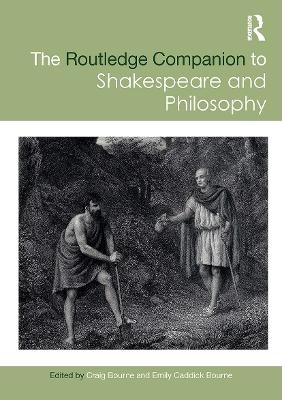
The Routledge Companion to Shakespeare and Philosophy
Routledge (Verlag)
978-1-032-56980-2 (ISBN)
Iago’s ‘I am not what I am’ epitomises how Shakespeare’s work is rich in philosophy, from issues of deception and moral deviance to those concerning the complex nature of the self, the notions of being and identity, and the possibility or impossibility of self-knowledge and knowledge of others. Shakespeare’s plays and poems address subjects including ethics, epistemology, metaphysics, philosophy of mind, and social and political philosophy. They also raise major philosophical questions about the nature of theatre, literature, tragedy, representation and fiction.
The Routledge Companion to Shakespeare and Philosophy is the first major guide and reference source to Shakespeare and philosophy. It examines the following important topics:
What roles can be played in an approach to Shakespeare by drawing on philosophical frameworks and the work of philosophers?
What can philosophical theories of meaning and communication show about the dynamics of Shakespearean interactions and vice versa?
How are notions such as political and social obligation, justice, equality, love, agency and the ethics of interpersonal relationships demonstrated in Shakespeare’s works?
What do the plays and poems invite us to say about the nature of knowledge, belief, doubt, deception and epistemic responsibility?
How can the ways in which Shakespeare’s characters behave illuminate existential issues concerning meaning, absurdity, death and nothingness?
What might Shakespeare’s characters and their actions show about the nature of the self, the mind and the identity of individuals?
How can Shakespeare’s works inform philosophical approaches to notions such as beauty, humour, horror and tragedy?
How do Shakespeare’s works illuminate philosophical questions about the nature of fiction, the attitudes and expectations involved in engagement with theatre, and the role of acting and actors in creating representations?
The Routledge Companion to Shakespeare and Philosophy is essential reading for students and researchers in aesthetics, philosophy of literature and philosophy of theatre, as well as those exploring Shakespeare in disciplines such as literature and theatre and drama studies. It is also relevant reading for those in areas of philosophy such as ethics, epistemology and philosophy of language.
Craig Bourne is Reader in Philosophy at the University of Hertfordshire, UK. He works mainly on metaphysics, philosophy of language and aesthetics. His books include A Future for Presentism (2006) and Time in Fiction (co-authored with Emily Caddick Bourne, 2016). Emily Caddick Bourne is Visiting Research Fellow at the University of Hertfordshire, UK. She works mainly on the intersection between metaphysics, philosophy of language and aesthetics. Her publications include Time in Fiction (co-authored with Craig Bourne, 2016). She is a Trustee of the British Society of Aesthetics.
List of Figures. List of Contributors. Preface. Acknowledgments. Introduction, Craig Bourne and Emily Caddick Bourne. Part 1: Situating Shakespeare. Chapter 1 Shakespeare, Montaigne, and Philosophical Anti-Philosophy, Philip Smallwood. Chapter 2 The (New and Old) Metaphysical Reading of Shakespeare, Géza Kállay. Chapter 3 On the Kinship of Shakespeare and Plato, Daryl Kaytor. Part 2: Philosophy of Language. Chapter 4 Lear as a Tragedy of Errors: ‘He hath ever but slenderly known himself’, Garry L. Hagber. Chapter 5 Figures Unethical: Circumlocution and Evasion in Act I of Macbeth, Scott F. Crider. Chapter 6 Conversational Perversions, Implicature and Sham Cancelling in Othello, Craig Bourne and Emily Caddick Bourne. Chapter 7 ‘Seize it, if thou dar’st’: Three Types of Imperative Conditional in Richard II, Borut Trpin. Chapter 8 The Sonnets and Attunement, Maximillian de Gaynesford. Chapter 9 'To Thine Own Self Be True': 'Truthiness', Shakespeare, Eco and the Open Work, Michael Troy Shell. Chapter 10 Wittgenstein’s Enigmatic Remarks on Shakespeare, Wolfgang Huemer. Part 3: The Ethical and The Political. Chapter 11, Shakespeare, Intention, and the Ethical Force of the Involuntary, Christopher Crosbie. Chapter 12 ‘Thou weep’st to make them drink’: Hospitality and Mourning in Timon of Athens, Sophie Emma Battell. Chapter 13 Shakespeare, Moral Judgements and Moral Realism, Matthew H. Kramer. Chapter 14 Blindness and Double Vision in Richard III: Zamir on Shakespeare on Moral Philosophy, Rafe McGregor. Chapter 15 Horatio's Stoic Philosophy, Jan H. Blits. Chapter 16 Sovereignty, Social Contract and the State of Nature in King Lear, Stella Achilleos. Chapter 17 Justice - Some Reflections on Measure for Measure, Tzachi Zamir. Chapter 18 Kiss me K…: Engendering Judgment in Kant's 1st Critique and Shakespeare's The Taming of the Shrew, Jennifer Ann Bates../Part contents
| Erscheinungsdatum | 17.07.2023 |
|---|---|
| Reihe/Serie | Routledge Philosophy Companions |
| Verlagsort | London |
| Sprache | englisch |
| Maße | 174 x 246 mm |
| Gewicht | 1029 g |
| Themenwelt | Literatur ► Lyrik / Dramatik ► Dramatik / Theater |
| Kunst / Musik / Theater ► Theater / Ballett | |
| Geisteswissenschaften ► Philosophie | |
| ISBN-10 | 1-032-56980-8 / 1032569808 |
| ISBN-13 | 978-1-032-56980-2 / 9781032569802 |
| Zustand | Neuware |
| Informationen gemäß Produktsicherheitsverordnung (GPSR) | |
| Haben Sie eine Frage zum Produkt? |
aus dem Bereich


